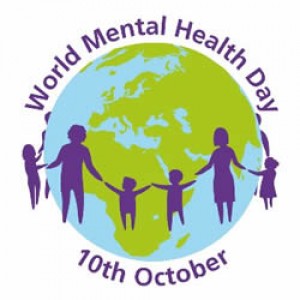World Mental Health Day October 10th
The World Health Organisation (WHO) declared October 10th as ‘World Mental Health Day’. This year’s theme is “Dignity in Mental Health”. WHO want to ensure that people with mental illness are treated with the courtesy, respect and dignity that they deserve. In the past, and perhaps still today, thousands of people suffering from poor mental health have been subjected to both physical and emotional abuse in mental health hospitals, and in the community. Under qualified staff and dilapidated buildings have not helped matters. However, it is important to note that there are many health care facilities that treat their patients with the upmost care and respect. Mental health staff are asked to inform patients before they commence their treatment. They are advised to include the patients in decisions regarding their health. In Ireland approximately 80,000 people suffer from psychosis or schizophrenia. Thousands more suffer from addictions, eating disorders, depression, bipolar disorder, dementia, Alzheimer’s and personality disorders.
We have come a long way from the times when people in asylums were cuffed to the bed in an isolated room, left wailing in despair. Then after the nurse administered them with an intravenous sedation, they were left drooling and comatose, unaware of their dreary surroundings. I find it incomprehensible as to how they could treat them so cruelly. They were human beings, not wild animals. Not that I condone sedating or cuffing wild animals. Thankfully now we have become much more aware of mental illness, and of how we can help the person to cope with it.
Nowadays it is acceptable to say that you suffer from depression, whereas years ago you would have been given a stern look, and harshly told to ‘pull your socks up and to get on with it’. People have begun to understand that this is a chemical imbalance in the brain and you need medication, or some form of therapy to help you to get well. Depression affects about 20 percent of European people at some point in their lives. This debilitating condition is the largest cause of illness in Europe. In relation to eating disorders people have definitely progressed with their knowledge and compassion for sufferers. They used to be thought of as ‘looking for attention’, whereas now we understand that it is how the person copes with their emotions, and it is a type of safety for them. In Ireland the Department of Health estimates that about 200,000 people suffer from eating disorders.
Although it is predominantly a female disease, men have become more susceptible to it in recent years, but it is difficult to find reliable statistics, because a lot of men don’t come forward for help. This is probably due to the stigma of it being viewed as a female’s disease. The eating disorder sufferer wants to control her/his weight because everything else in her/his life feels so chaotic. She/he doesn’t realize that the ‘heaviness or fat’ that she/he feels is actually the negative emotions that she/he are carrying. She/he may feel as though she/he is peeping through a window watching everything, but feeling disconnected from it. Eating disorders are very lonely conditions but they are treatable through therapy and having a good support network.
About 48,000 people in Ireland currently suffer from some form of dementia. The Alzheimer’s Society of Ireland is a voluntary organisation which deals with dementia and alzheimer’s. It provides support for the sufferers, their families and their carers. The services includes social clubs, alzheimer’s cafes, support groups, family carer education programmes, day care centres, home care services, respite care, information and support services which include a helpline and dementia advisory services.
According to Professor Jim Lucey, Medical Director of St Patrick’s Hospital, mental health and general health are interconnected. He said that if mental health conditions are not treated the person has an increased risk of death from heart disease, cancer and diabetes. Our perception of mental health must be to embrace and respect the needs and rights of the whole person. It is vital that young people are taught mental health awareness in school.
Almost 75% of mental health problems occur before the age of 25. That is why it is necessary to inform young people about mental health disorders, and therapies to help them to develop resilience and emotional intelligence. Talk therapies such as CBT, should become more accessible for people. The internet has benefited people worldwide to obtain information regarding mental health problems. This has created a better understanding of their personal, or a loved one’s mental health difficulties.
Around 40,000 people in Ireland have bipolar disorder. It disrupts every aspect of a person’s life, from personal relationships, finances and their professional life. Research published in Biological Psychiatry has discovered that brain imaging scans which were taken from people with bipolar disorder, were different to healthy people’s scans.
Lithium has proven to be a successful medication for the treatment of bipolar disorder. It is a salt based natural element, which corrects the chemical imbalance in the person’s brain. Lithium helps to repair and develop the section of the brain where mood and thoughts are controlled.
World Mental Health Day will put all these issues on the global stage, take from the dark and into the open, we need this openness to effectively deal with the situation.
Mental health support groups
The Alzheimer’s Society of Ireland
Helpline: 1 800 341 341
Phone: 01 207 3800
info@alzheimer.ie
www.alzheimer.ie
Bodywhys the Eating Disorder Association of Ireland
Helpline: 1890 200 444
Phone: 01 2834 963
info@bodywhys.ie
www.bodywhys.ie
Grow World Community Mental Health Movement of Ireland
Phone: 1890 474 474
Email: info@grow.ie
www.grow.ie
Aware Ireland
Phone: 01 661 7211
Email: info@aware.ie
www.aware.ie









